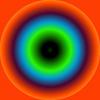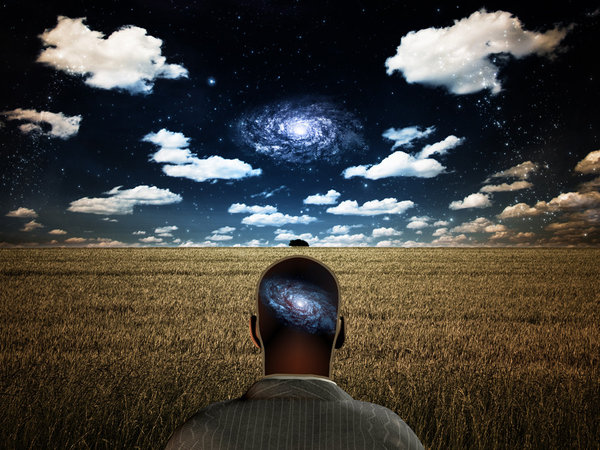 Submitted by ZERO POINT - Ex... on
Submitted by ZERO POINT - Ex... on

One of the ways contemporary ‘scientism’ encroaches upon metaphysics is through an irresponsible use of such terms as ‘zero’ and ‘infinity’. Mathematics as ‘pure abstraction’ seems to the uninformed like a kind of ‘mystical language’ empowering scientists to unravel the secrets of the universe and to express them in precise terms that allow technicians - whom we like to call ‘wizards’ - to transform them into devices of awesome complexity and power.
Guénon agrees with Plato that mathematics can furnish symbols for metaphysics. But it cannot fulfill this function if metaphysical principles in themselves are not understood-which they clearly are not by the vast majority of modern mathematicians and scientists. Guénon sees Leibnitz, discoverer of the infinitesimal calculus and major critic of Descartes, as a significant modern philosopher of mathematics, whose insights are worth placing in a metaphysical context-something Leibnitz himself tried to do. Guénon helps make these efforts more metaphysically intelligible, and transposes them to a higher level. In Metaphysical Principles of the Infinitesimal Calculus, René Guénon points the way toward a rediscovery of mathematics as the handmaiden of metaphysics.
Although we speak casually of infinity and the infinite in our daily lives, the notion of infinite is perplexing and complex, worthy of much more attention and precision. Even in its modern mathematical sense, infinity keeps its popularity as a topic dealt in many academic discussions, difficulties, and misunderstandings. Throughout the history, it has been the source of many controversies as in paradoxes of Zeno of Elea (about 490 BC-about 430 BC), the Hilbert's (1862-1943) paradox of the grand hotel, and the philosophical and mathematical discussions on the Leibniz's (1646-1716) method of infinitesimal calculus.
Zeno of Elea was a pre-Socratic Greek philosopher of southern Italy and a member of the Eleatic School founded by Parmenides. He argued that an object in motion can never pass from one position to another, because between the two there is always an "infinity" of other positions, however close, that must be successively traversed in the course of the motion, and this "infinity" can never be exhausted. David Hilbert is a German mathematician who postulated a hypothetical hotel with "countably infinitely" many rooms, all of which are occupied. Since the hotel has "infinitely" many rooms, we can move the guest occupying room 1 to room 2, the guest occupying room 2 to room 3, and so on, and fit a newcomer into room 1. By repeating this procedure, it may be argued that it is possible to make room for any finite number of new guests, although every room of this hotel initially contains a guest.
The following two quotations from two contemporary authors may provide more substance about the nature of the problem:
On the other hand, involvement with the infinite brings with it a huge range of difficulties. In particular, there are the many puzzles and paradoxes that have been outlined in the pages of this book. Moreover, there are the many quite fundamental problems that arise for such apparently simple notions as counting, adding, maximizing, and so forth. Because we are so firmly wedded to limit notions-"best," "first," "greatest," "maximum," and so forth-that do not sit easily with the infinite, it is very hard to see how we can make our peace with the infinite.
The infinite has always been a slippery concept. Even the commonly accepted mathematical view, developed by Georg Cantor, may not have truly placed infinity on a rigorous foundation.
In the present article, we attempt to summarize Rene Guenon's (1886-1951) alternative way of thinking on the idea of infinite from the perspective of the traditional metaphysical science. Much more detailed presentation of his perspective can be found in his (1886-1951) valuable study The Metaphysical Principles of the Infinitesimal Calculus from which we will extensively quote here.
Guenon considered mathematics as providing a particularly proper symbolism for the expression of metaphysical truths to the extent that they are expressible. However, he states that "in order for this to be so it is above all necessary that these sciences be rid of the various errors and confusions that have been introduced by the false views of the moderns."
To follow Guenon's paradigm it is necessary to start with the metaphysical notion of the universal-All which comprehends all possibilities, the non-manifested as well as the manifested Universe, that is, the cosmos. The universal All leaves outside itself only the impossible that is a pure nothing. A determination is to define a certain domain of possibilities in relation to all the rest which is expressed by Spinoza (1632-1677) as omnis determinatio negatio est (all determination is a negation). The first of all determinations is Being itself. "Number is only a mode of quantity, and quantity itself only a category or special mode of being, not coextensive with it, or more precisely still, quantity is only a condition proper to one certain state of existence in the totality of universal existence." Number, space, and time are all determined conditions.
The Infinite, understood in its true, metaphysical sense, has no limits since its opposite, finite is synonymous with limited. Therefore, according to Guenon,
... one cannot correctly apply this term to anything other than that which has absolutely no limits, that is to say the universal All. Furthermore, there can obviously be only one Infinite, for two supposedly distinct infinities would limit and therefore inevitably exclude one another.
He further states, "The Infinite, in its true sense, can have neither opposite nor complementarity." The scholastic distinction between "the infinite in a certain respect" and "the absolute infinite" cannot be accepted. If a thing is not limited in a certain sense or in a certain respect than one can legitimately conclude that it is limited in no way at all, and since a determined thing does not include every possibility, as such it can only be finite.
Given any number, one can form the next by adding a unit gives the sequence of numbers to us. Therefore, we cannot actually reach its limits. However, the impossibility of reaching the limits of certain things in the manifested Universe should not cause the illusion that these determined things have no limits at all. In order to replace the false notion of "determined infinite," Guenon introduces, the idea of the indefinite, which is precisely the idea of a development of possibilities the limits of which we cannot actually reach; and this is why we (Guenon) regard this distinction between the Infinite and the indefinite as fundamental to all questions in which the so-called mathematical infinite appears.
According to Descartes (1596-1650), the indefinite is that of which we do not perceive the limits, and which in reality could be infinite. On the contrary, Guenon affirms that
(T)he indefinite cannot be infinite because it always implies a certain determination, whether it is a question of extension, duration, divisibility, or some other possibility; in a word, whatever the indefinite may be, and according to whatever aspect it is considered, it is still of the finite and can only be of the finite.
The idea of an "infinite number" understood as "the greatest of all numbers," or "the number of all numbers" is contradictory. The impossibility of an "infinite number" can be established by various arguments:
(T)o every whole number (integer) there corresponds another number equal to its double, such that one can make the two sequences correspond term by term, with the result that the number of terms must be the same in both; but there are obviously twice as many whole numbers as there are even, since even numbers alternate by twos in the sequence of whole numbers; one thus ends up with a manifested contradiction.
Guenon insists that number, despite its indefinitude, is by no means applicable to all that exists and the multitude of all numbers cannot constitute a number, which, moreover, is finally only an application of the incontestable truth that what limits a certain order of possibilities must necessarily be beyond and outside that which it limits.
On the other hand, the idea of multitude, contrary to that of number, is applicable to all that exists which allows one to speak of the multitude of divine attributes for example, or again of the multitude of angels, that is, of beings belonging to states that are not subject to quantity, where, consequently, there can be no question of number.
Number itself can also be regarded as a species of multitude, but on the added condition that it be a "multitude measured by the unit" according to the expression of Saint Thomas Aquinas (1225-1274).
The term "indefinite" consists of something unfinished. The "non-measured" is that which has not yet been defined, which is only incompletely realized within manifestation. The multitude of all numbers is "innumerable" or "non-measured," which is not to say they are infinite, but merely that they are indefinite.
Guenon calls whole number as true number or pure number. He accepts that the numbers other than whole numbers can be considered as the extensions or generalizations of the idea of number. However, he adds that these extensions are also distortions. According to Guenon, numerical quantity has a discontinuous character, whereas spatial or temporal magnitudes, for example, are continuous quantities. "Between these two modes of quantity is a difference of nature such that a correspondence between the two cannot be perfectly established." He distinguishes the arithmetical unit from the "units of measurement," which are magnitudes of another sort than number, notably geometric magnitudes. He defines a continuous quantity as an extension-however small it might be that will always remain indefinitely divisible.
Guenon is against atomism, which necessarily implies the discontinuity of all things. He argues extension cannot be composed of indivisible elements, for these elements would have to be extensionless to be truly indivisible, and a sum of elements with no extension can no more constitute an extension than a sum of zeros can constitute a number, that is why points are not the elements or parts of a line; the true linear elements are always distances between points, which latter are only their extremities. Points multiplied by any quantity at all can never produce length, since, rigorously speaking, they are null with respect to length; the true elements of a magnitude must always be of the same nature as the magnitude, although incomparably less: this leaves no room for indivisibles.
Further,
The point, which, being indivisible, is by that very fact without extension, that is, spatially null, but which, as we (Guenon) have explained elsewhere, is nonetheless the very principle of all extension.
For Guenon, Zeno of Elea's arguments are against atomism and indeed, they prove that without continuity there would be no possible motion.
It is this very conception of motion that is in error, for it amounts in short to regarding the continuous as if it were composed of points, or of final, indivisible elements, like the notion according to which bodies are composed of atoms; and this would amount to saying that in reality there is no continuity, for whether it is a question of points or atoms, these final elements can only be discontinuous.
And, "The possibility of motion presupposes the union, or rather the combination, of both temporal and spatial continuity."
We consider Guenon as an important and prominent example of thinkers who tried to remind people of the traditional metaphysical ideas. This metaphysical perspective does not share the modern tendency to attribute more importance to the practical applications of science than to science itself. This perspective attempts to link science back to principles of a higher order so that a particular science can be used as a support for elevating oneself to a higher knowledge.
Ali Sebetci - http://www.fountainmagazine.com
- 3293 reads